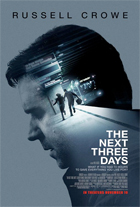The Next Three Days
|  In The Next Three Days, Russell Crowe plays a Pittsburgh-based community college professor named John Brennan whose normal, everyday life is upended when his wife Lara (Elizabeth Banks) is arrested and convicted for murdering her boss. The film’s opening scene, in which John and Lara have dinner with his brother and sister-in-law, quickly establishes that John and Lara are deeply in love, but also that they have decidedly different temperaments: Where John is reserved, Lara has a fiery temper. Thus, the film implies that Lara might very well be guilty of murder, a point driven home by the failure of various appeals due to the overwhelming evidence against her (including fingerprints on the murder weapon, an eyewitness placing her at the scene, and blood from the victim on her coat). Yet, John never waivers in his belief that she is innocent, and he dutifully toils away at being both a single dad to their young son (Ty Simpkins) and an amateur legal expert trying to prove her innocence. In The Next Three Days, Russell Crowe plays a Pittsburgh-based community college professor named John Brennan whose normal, everyday life is upended when his wife Lara (Elizabeth Banks) is arrested and convicted for murdering her boss. The film’s opening scene, in which John and Lara have dinner with his brother and sister-in-law, quickly establishes that John and Lara are deeply in love, but also that they have decidedly different temperaments: Where John is reserved, Lara has a fiery temper. Thus, the film implies that Lara might very well be guilty of murder, a point driven home by the failure of various appeals due to the overwhelming evidence against her (including fingerprints on the murder weapon, an eyewitness placing her at the scene, and blood from the victim on her coat). Yet, John never waivers in his belief that she is innocent, and he dutifully toils away at being both a single dad to their young son (Ty Simpkins) and an amateur legal expert trying to prove her innocence.Yet, the system doesn’t always work in your favor, and when John discovers after the final appeal is lost that Lara will be transferred from the Allegheny County prison to a maximum security federal prison hundreds of miles away, he knows that he must discard rationality and break her out, an endeavor he approaches calmly and methodically, if not always elegantly. He first approaches a former convict who wrote a book about his multiple prison breaks (Liam Neeson). He supplies some general ideas about what to do, as well as a word of warning about the determination John will need to see it through. John then sets about developing a plan, which he plots on his bedroom wall with maps, photographs, and charts (for his own benefit as well as ours). He does a lot of research on the Internet (Googling information about prison routines and watching YouTube videos on how to create a “bump key”), but when it comes to procuring the supplies he needs, especially falsified IDs, he must regularly drive his suburban-dad Toyota Prius into Pittsburgh’s darker environs. Meanwhile, Lara is becoming more and more despondent, years of imprisonment wearing on her emotionally even though Elizabeth Banks maintains a healthy physical presence. Writer/director Paul Haggis, who is adapting a 2008 French film called Pour Elle, works the material with steely confidence, and for most of its running time The Next Three Days has a solid sense of tick-tock B-movie tension and suspense; if it were shot in black and white and set in 1945, it might make for a pitch-perfect film noir (alternately, shot in Technicolor and set in 1955, it would make great material for mid-career Hitchcock). The film is never for a second boring, and John’s plotting and the constant danger in which he must put himself has a real charge. Because the film remains purposefully ambiguous about Lara’s guilt or innocence until the very end, John’s actions may be either those of a righteous savior or a madman, which gives the film’s otherwise routine genre elements an added spark. There are several points when it seems that everything could go terribly, horribly wrong, and it is testament to Haggis that he makes the danger feel as real as it does. Yet, there is a fundamental flaw in the film’s execution, as it asks us to believe that a mild-mannered literature professor is not only capable of plotting and executing such a complex plan, but also using violence when necessary against both criminals and the law. This is partially rationalized, at least narratively, by John taking seriously his own lecture on Don Quixote, in which he asks his students, “What if we chose to exist in a reality completely of our own making?” Haggis essentially extends this idea to the film as a whole, using John’s single-minded determination to excuse a lack of genuine character development. When John ambushes two hardened criminals in a Pittsburgh ghetto to finance his plan, there is no sense of the kind of terror and desperation that would define such an action. Rather, once he has a gun in hand and a mission to accomplish, Russell Crowe starts slipping into comfortable action-movie heroics, rather than the kind of nerve-wracked tension that would more likely envelop such an endeavor (you can feel Haggis’s work on the last two James Bond movies starting to infiltrate the material). There is a fascinating film to be made that truly explores what it would take for an ordinary, nonviolent soul like John to become someone capable of using violence to exact what he perceives to be true justice, and while The Next Three Days has sparks of such a film, it is ultimately too willing to conceded complexities for more reliable Hollywood thrills. Copyright ©2010 James Kendrick Thoughts? E-mail James Kendrick All images copyright © Lionsgate |
Overall Rating: 

 (2.5)
(2.5)


